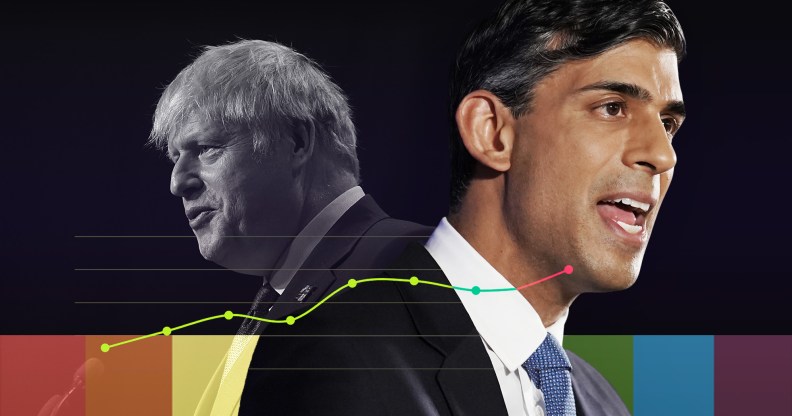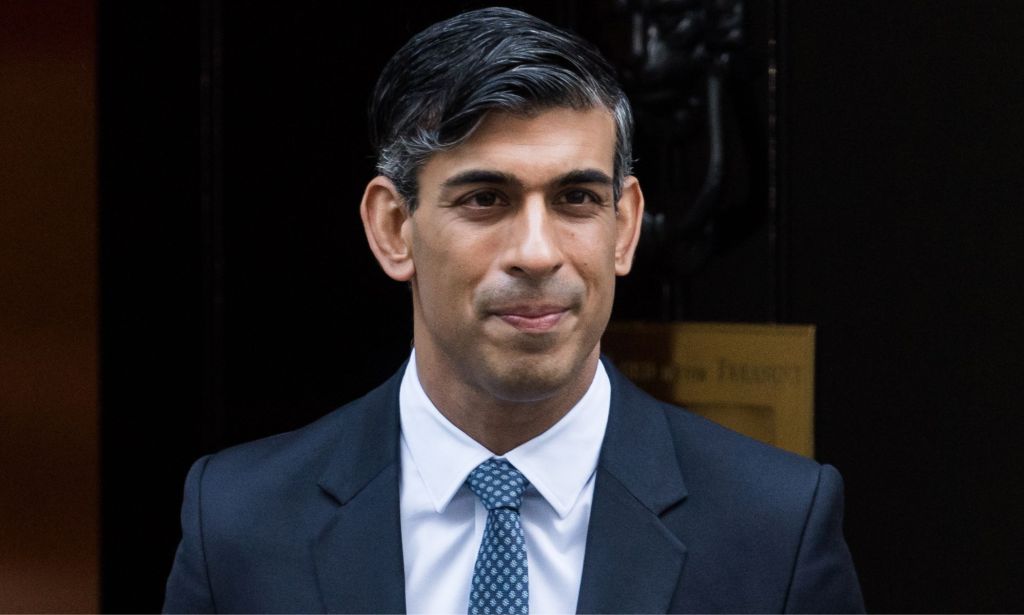Boris Johnson and Rishi Sunak caused ‘serious damage’ to LGBTQ+ rights in UK, damning report finds

‘The most violent year for LGBTQI people’: New report reveals the horrific impact of hate speech (Getty Images)
An annual report on the state of queer rights across Europe has found that 2022 was the most violent year for LGBTI people across the region in the past decade – and the rise in hate speech is to blame.
Boris Johnson and Rishi Sunak have been named as two people who helped drive that rise, by spreading anti-trans rhetoric in the UK.
European LGBTQ+ advocacy group ILGA-Europe’s review, published on Monday (20 February), found that “pervasive hate speech” across the continent over the past year has led to “life or death consequences”.
Having reported on LGBTQ+ rights for 12 years, ILGA-Europe claimed that 2022 was the most violent year for LGBTQ+ people yet, due to “planned, ferocious attacks” – including mass shootings in Oslo, Norway, and the Slovakian capital of Bratislava – and “rising and widespread hate speech from politicians, religious leaders, right-wing organisations and media pundits”.
The report highlighted hate speech as a “serious issue” in several European countries, with Austria and France reporting peaks around Pride events.
The rise in hate speech went along with an increase in anti-LGBTQ+ violence, with the organisation claiming that, over the past year, “there has not only been a stark rise in violence against LGBTI people, but in the severity of that violence”.
ILGA-Europe added that this includes “greater numbers of trans people being attacked and murdered”.
The report’s section focusing on the UK called out prime minister Rishi Sunak and former PM Boris Johnson for anti-trans rhetoric, which it said caused “serious damage” to the British LGBTQ+ community.
This follows a similar trend seen in last year’s report, which claimed that JK Rowling’s comments on trans people had led to “significant damage” to the community.
ILGA-Europe also claimed that certain moves by Johnson during his leadership, including the now-backtracked decision to not include trans people in a potential ban on conversion therapy, as well as his support for a ban on trans women competing in elite swimming, has led to politicians “weaponising trans rights”.
The report went on to flag that when Sunak became PM, he made “anti-trans statements, including ‘trans women are not women’”.
Hate speech in the UK, including “hostile reporting in mainstream newspapers”, correlated with a rise in hate crimes against LGBTQ+ people, which in 2022 “reached dramatic numbers”, the report said.
“The Home Office’s annual… statistics report highlighted that homophobic hate crimes increased by 41 per cent and transphobic hate crimes by 56 per cent, in England and Wales,” the report continued, attributing a rise in transphobic hate crimes to “anti-trans media reporting”.
It concluded: “This marks the starkest annual increase since 2012.”

ILGA-Europe’s executive director, Evelyne Paradis, said: “We have been saying for years now that hate speech in all its forms translates into actual physical violence.
“This year, we have seen that violence become increasingly planned and deadly, leaving LGBTI people feeling unsafe in countries across Europe.
“We have seen proof that anti-LGBTI hate speech is not just the words of marginal leaders or would-be autocrats, but a real problem with dire consequences for people and communities.
“This phenomenon is not only in countries where hate speech is rife, but also in countries where it is widely believed that LGBTI people are progressively accepted.”
While progress was made throughout Europe, with conversion therapy banned in several countries, and Spain passing sweeping reforms allowing self-ID for trans people, Paradis called for more to be done.
“While we are getting better at dealing with outcomes, the focus has to be on stopping hate speech in all its forms,” she said.
“Across Europe, many politicians have reacted with horror to the killings of LGBTI people this year, and while clear expressions of solidarity are always needed, it does not address the foundation of the problem, which is the proliferation of using hatred against LGBTI people for political gain.
“Our leaders need to find ways to proactively fight the rise of hate speech, rather than finding themselves in the position of reacting to its consequences.”

